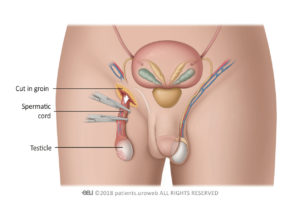Table of Contents
What is an orchidectomy?
Some men may be offered an operation, called an orchidectomy, to help control their prostate cancer. An orchidectomy involves having surgery to remove both testicles.
Having an orchidectomy to manage prostate cancer is not usually recommended ahead of hormonal therapy, but it is recommended in patients who cannot take hormonal therapy or those who are experiencing severe side effects of their treatment.
What happens during the surgery?
An orchidectomy is usually done using a local anaesthetic, so you will not feel anything, but you will be awake. A small cut will be made in your groin allowing your surgeon to access your testicles and detach them from the spermatic cord.
The tissue that surrounds the testicles is not removed during the procedure, so your scrotum will not look totally empty. Some men choose to have a prothesis (fake testicle), so their scrotum looks and feels the same. If you decide to have a prosthesis, once your testicles have been removed, your surgeon may replace them with the prosthesis during the same procedure.
Are there any risks from having the surgery?
An orchidectomy is considered minor surgery, but like all operations, there are a few risks. You may feel some discomfort after the procedure, but if you experience pain you should speak to your doctor straightaway. The biggest risk is bleeding into the scrotum, called a hematoma.
It is quite common for the scrotum to be bruised, swollen, and tender for 2 to 4 weeks after surgery.
You will also be left with a scar where your skin was cut. If you think your scar is not healing right, speak to your doctor and arrange to have it examined.
What are the side effects of having an orchidectomy?
You may experience some of the side effects of hormone therapy such as:
• Hot flushes
• Erectile dysfunction
• Reduced sex drive
• Weight gain
What happens if I change my mind?
An orchidectomy cannot be reversed, so you would need to be sure that this is the right treatment option for you. Although the surgery is considered minor, we understand having your testicles removed is a major decision! You may find it helpful to talk to other men who have had an orchidectomy and understand the journey ahead.
What happens if the cancer keeps growing?
Depending on your specific situation and what the aims of your treatment are, you may be prescribed additional treatments on top of the orchidectomy. Your doctor will discuss your treatment plan with you. Depending on the stage and aggressiveness of your cancer, radiation, chemotherapy, or additional surgery may be offered to you.


